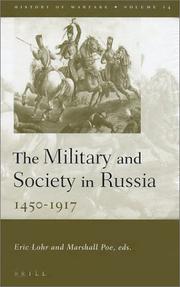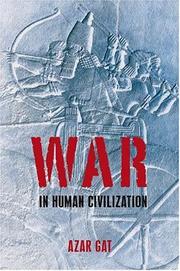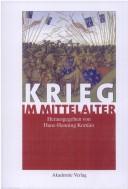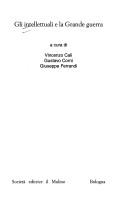| Listing 1 - 10 of 35 | << page >> |
Sort by
|

ISBN: 1280464909 9786610464906 141753673X 9047401077 9781417536733 9004122737 9789004122734 9789047401070 9781280464904 6610464901 Year: 2002 Publisher: Leiden Boston, MA Brill
Abstract | Keywords | Export | Availability | Bookmark
 Loading...
Loading...Choose an application
- Reference Manager
- EndNote
- RefWorks (Direct export to RefWorks)
This work covers the interaction of the Russian military and society in the early modern and modern period. It covers the myriad political, economic and cultural currents that shaped the Russian armed forces from their beginnings in Muscovite times to the end of World War I.
War and civilization --- Civilization and war --- Civilization --- Russia --- History, Military.

ISBN: 1857530551 Year: 1994 Publisher: London Washington Brassey's
Abstract | Keywords | Export | Availability | Bookmark
 Loading...
Loading...Choose an application
- Reference Manager
- EndNote
- RefWorks (Direct export to RefWorks)
850 Vrede- en conflictstudies --- War and civilization --- History --- 20th century --- War and civilization - History - 20th century. --- Civilization and war --- Civilization
Book
ISBN: 9780472072989 9780472052981 9780472121595 0472121596 0472052985 0472072986 Year: 2016 Publisher: Ann Arbor
Abstract | Keywords | Export | Availability | Bookmark
 Loading...
Loading...Choose an application
- Reference Manager
- EndNote
- RefWorks (Direct export to RefWorks)
Many famous texts from classical antiquity—by historians like Thucydides, tragedians like Sophocles and Euripides, the comic poet Aristophanes, the philosopher Plato, and, above all, Homer—present powerful and profound accounts of wartime experience, both on and off the battlefield. They also provide useful ways of thinking about the complexities and consequences of wars throughout history, and the concept of war broadly construed, providing vital new perspectives on conflict in our own era. Our Ancient Wars features essays by top scholars from across academic disciplines—classicists and historians, philosophers and political theorists, literary scholars, some with firsthand experience of war and some without—engaging with classical texts to understand how differently they were read in other times and places. Contributors articulate difficult but necessary questions about contemporary conceptions of war and conflict.
War (Philosophy). --- War and civilization. --- Greece --- Rome --- History, Military. --- War (Philosophy) --- War and civilization --- War --- Philosophy --- Civilization and war --- Civilization --- E-books

ISBN: 128075916X 0191532258 1429460210 9780191532252 9781429460217 9786610759163 6610759162 0199262136 9780199262137 Year: 2006 Publisher: Oxford New York Oxford University Press
Abstract | Keywords | Export | Availability | Bookmark
 Loading...
Loading...Choose an application
- Reference Manager
- EndNote
- RefWorks (Direct export to RefWorks)
In this truly global study, Azar Gat sets out to unravel the 'riddle of war' throughout human history, from the early hunter-gatherers right through to the unconventional terrorism of the twenty-first century. - ;Why do people go to war? Is it rooted in human nature or is it a late cultural invention? How does war relate to the other fundamental developments in the history of human civilization? And what of war today - is it a declining phenomenon or simply changing its shape?. In this truly global study of war and civilization, Azar Gat sets out to find definitive answers to these questions i
War and society. --- War and civilization. --- War --- Civilization and war --- Civilization --- Society and war --- Sociology --- Civilians in war --- Sociology, Military --- History. --- Social aspects
Book
ISBN: 1009114271 1009110306 1009118528 1009118609 Year: 2022 Publisher: Cambridge ; New York, NY : Cambridge University Press,
Abstract | Keywords | Export | Availability | Bookmark
 Loading...
Loading...Choose an application
- Reference Manager
- EndNote
- RefWorks (Direct export to RefWorks)
This Element is a user's guide to the cultural history of warfare since 1914. It provides summaries of the basic questions historians have posed in what is now a truly global field of research. It is divided into three parts. The first provides an introduction to the cultural history of the state, focusing on the institutions of violence, both political and military, as well as introducing the key concept of the civilianization of war. The second part addresses civil society at war. It asks the question as to how do men and women try to make sense and attach meaning to the violence and cruelty of war. It also explores commemoration, religious life, humanitarianism, painting, cinema and the visual arts, and war literature and testimony. The third part explores the family, gender and migration in wartime, and shows how modern war continues to transform the world in which we live today.
War and society --- War and civilization --- History --- Civilization and war --- Civilization --- Society and war --- War --- Sociology --- Civilians in war --- Sociology, Military --- Social aspects

ISBN: 3050034963 1306501377 3050056312 Year: 2001 Publisher: Berlin Akademie Verlag
Abstract | Keywords | Export | Availability | Bookmark
 Loading...
Loading...Choose an application
- Reference Manager
- EndNote
- RefWorks (Direct export to RefWorks)
Die brennende Aktualität des Themas "Krieg" bedarf keiner Erläuterung. Doch sollte die bedrückende Realität den Blickwinkel auf dieses Phänomen keineswegs ausschließlich auf die gegenwärtige Situation beschränken. Wesentliche Aspekte – insbesondere grundlegende, langdauernde Faktoren und Strukturen – würden so nicht wahrgenommen. In dem von Hans-Henning Kortüm herausgegebenen Buch wird nicht nur der ganze Zeitraum des Mittelalters berücksichtigt, sondern es wird auch die Fülle der thematischen und methodischen Zugangsweisen demonstriert. Besonderes Gewicht kommt dabei dem Bemühen zu, die Chancen eines interdisziplinären Zugangs zum Thema zu nutzen: Die einzelnen Beiträge verfolgen historische, philosophische, kunsthistorische, wissenschaftshistorische und politikwissenschaftliche Fragestellungen. Der gemeinsame Ausgangspunkt ist in der Erkenntnis begründet, dass eine historische Betrachtung Krieg als kulturelles Phänomen ernst nehmen muss.
War and civilization --- Guerre et civilisation --- History --- Histoire --- Europe --- History, Military --- Histoire militaire --- Civilization and war --- Civilization --- 476-1492 --- To 1500 --- GUERRE --- STRATEGIE --- PRISONNIERS DE GUERRE --- HISTOIRE --- MOYEN AGE --- PHILOSOPHIE
Dissertation
ISBN: 905170612X Year: 2002 Publisher: Nijmegen Rozenberg
Abstract | Keywords | Export | Availability | Bookmark
 Loading...
Loading...Choose an application
- Reference Manager
- EndNote
- RefWorks (Direct export to RefWorks)
#SBIB:327.5H21 --- #SBIB:39A76 --- Vrede – oorlog, oorlogssituaties --- Etnografie: Oceanië --- Theses --- Ethnology --- War --- War and civilization --- Civilization and war --- Civilization --- Armed conflict (War) --- Conflict, Armed (War) --- Fighting --- Hostilities --- Wars --- International relations --- Military art and science --- Peace --- Kanake (New Guinea people)

ISBN: 8815076662 9788815076663 Year: 2000 Publisher: Bologna: Il Mulino,
Abstract | Keywords | Export | Availability | Bookmark
 Loading...
Loading...Choose an application
- Reference Manager
- EndNote
- RefWorks (Direct export to RefWorks)
World War, 1914-1918 --- War and civilization --- 940.3 --- Geschiedenis van Europa: Eerste Wereldoorlog--(1914-1919) (algemeen) --- 940.3 Geschiedenis van Europa: Eerste Wereldoorlog--(1914-1919) (algemeen) --- Civilization and war --- Civilization --- World War, 1914-1918 - Congresses --- War and civilization - Congresses
Book
ISBN: 0199336547 9780199336548 1306637767 0199376913 0199336555 9780199336555 Year: 2014 Publisher: New York
Abstract | Keywords | Export | Availability | Bookmark
 Loading...
Loading...Choose an application
- Reference Manager
- EndNote
- RefWorks (Direct export to RefWorks)
Why should we investigate the defeats of a society that almost never lost a war? In this book, Jessica H. Clark answers this question by showing what responses to defeat can tell us about the Roman definition of victory. The text traces Roman responses to the Second Punic War, showing the extent to which Rome's reputation as an inevitable military victor was constructed by political discourse.
Defeat (Psychology). --- Kriegführung. --- Niederlage. --- War and civilization --- War and civilization. --- 265-30 B.C. --- Rome (Empire). --- Rome --- Römisches Reich. --- History --- History, Military --- Defeat (Psychology) --- Guerre et civilisation --- Défaite (Psychologie) --- Défaite (Psychologie) --- Histoire --- Histoire militaire --- Emotions --- Civilization and war --- Civilization
Book
ISBN: 9780815353737 0815353731 9781351135597 9780367665739 Year: 2018 Publisher: London: Routledge,
Abstract | Keywords | Export | Availability | Bookmark
 Loading...
Loading...Choose an application
- Reference Manager
- EndNote
- RefWorks (Direct export to RefWorks)
"This volume focuses on the sources of Roman imperial power in the period AD 193-284. More specifically, it examines the impact of war on the foundations of the economic, political, military, and ideological power of third-century Roman emperors. This detailed study offers insight into this complex and transformative period in Roman history"--
Civilization. --- War and civilization --- War and civilization. --- 30 B.C.-476 A.D. --- Rome (Empire). --- Rome --- History --- Civilization --- War and civilization - Rome --- Rome - History - Empire, 30 B.C.-476 A.D. --- Rome - Civilization --- Civilization and war
| Listing 1 - 10 of 35 | << page >> |
Sort by
|

 Search
Search Feedback
Feedback About UniCat
About UniCat  Help
Help News
News